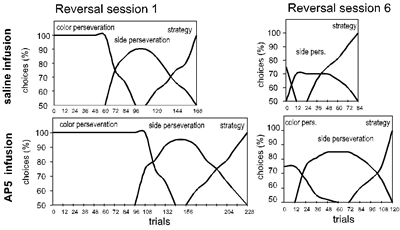
Strategies in birds: new methods to study reversal learning in pigeons
O. Güntürkün, B. Diekamp and S. Lissek
Department of Biopsychology, Faculty of Psychology, University of Bochum, Bochum, Germany
Cognitive studies with human subjects reveal that performance differences under different conditions may emerge due to shifts in cognitive strategies and not due to neural processing limitations as such. We were interested to develop means for a detailed analysis of strategy shifts during serial reversal learning in pigeons. In this task, subjects first learn a simple color discrimination. After reaching criteri-on, they are required to repress responses to the rewarded stimulus and to res-pond to the previously unrewarded one. Upon reaching criterion again, contingen-cies are reversed once more, etc. Since the activation of NMDA-receptors within the prefrontal cortex are known to be relevant for reversal tasks, we were interes-ted whether a local injection of AP5, a competitive NMDA-receptor antagonist, within the avian 'prefrontal cortex' results in reversal learning pertuberations.
Pigeons learned simultaneous color discrimination (red vs. green) with two pecking keys. They were reinforced with food; incorrect pecks resulted in 3-s time out. Acquisition was finished after reaching criterion (15 correct pecks in a row). In the next session, reinforcement values of the colors were switched. During such a reversal session pigeons first perseverated on the previously correct color. Thus, they were not reinforced at all. After about 40% of total trials needed, they switched from a color to a side perseveration strategy, i.e. they either preferred to peck on the right or the left key. Now the animals received reinforcement on about 50% of trials. Finally the animals learned to peck on the correct color and received food on 100% of trials.

Figure 1.
These data show that a detailed analysis of single choices during serial reversal tasks reveals different behavioral strategies of the animals that resemble 'hypotheses testing' plans in humans.
During the presentation, focus will be placed on methodological and technical aspects of these operant conditioning experiments.
Paper presented at Measuring Behavior 2000, 3rd International Conference on Methods and Techniques in Behavioral Research, 15-18 August 2000, Nijmegen, The Netherlands